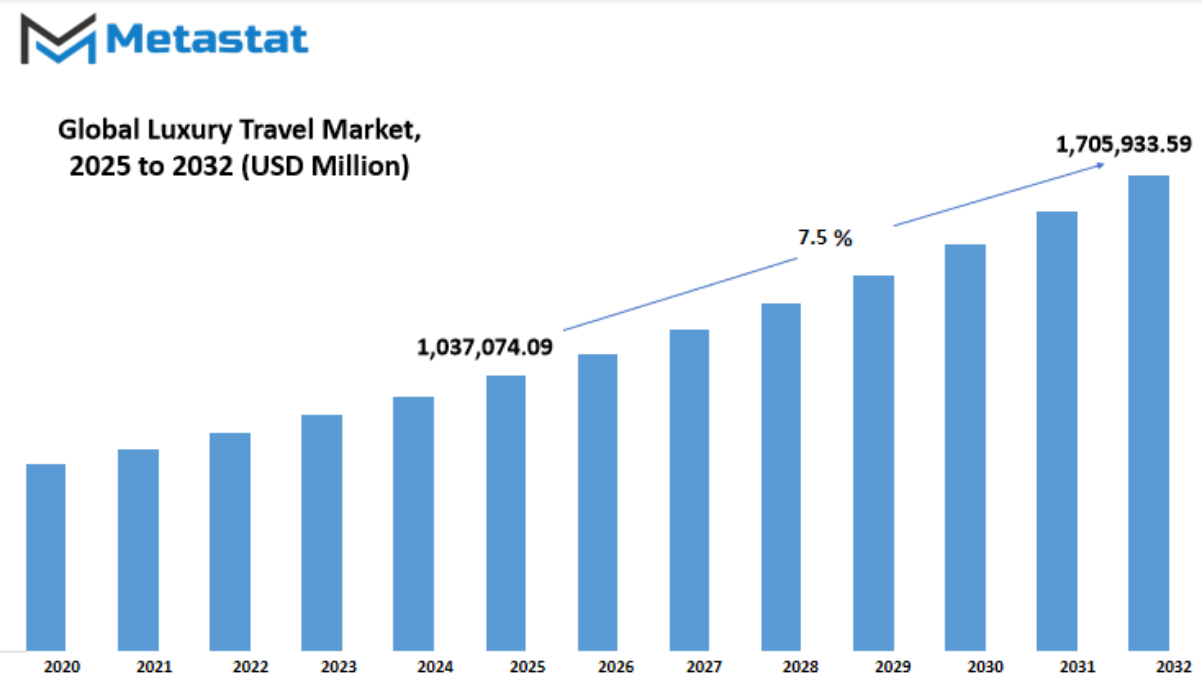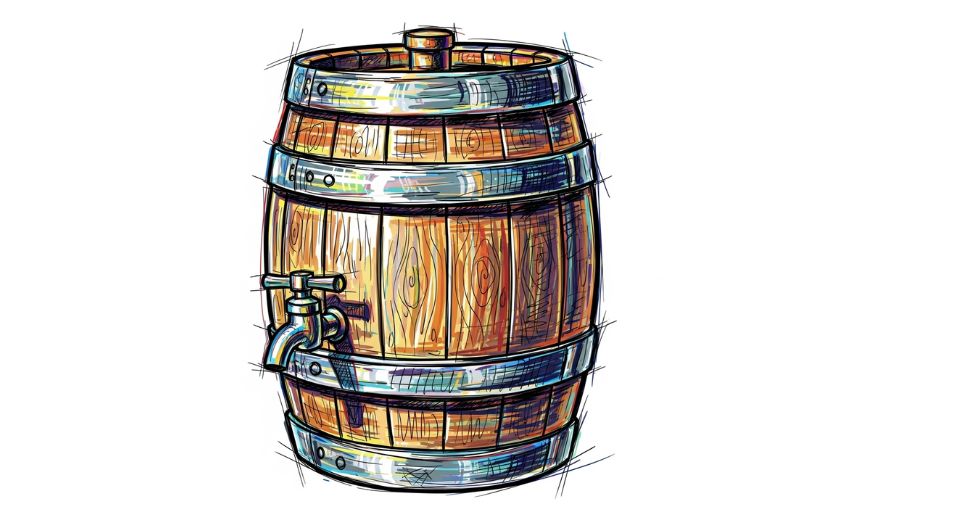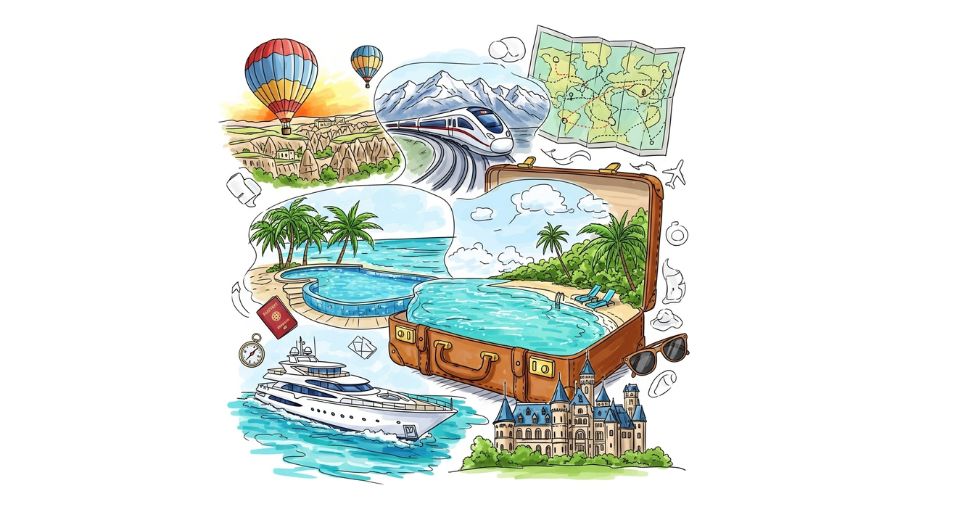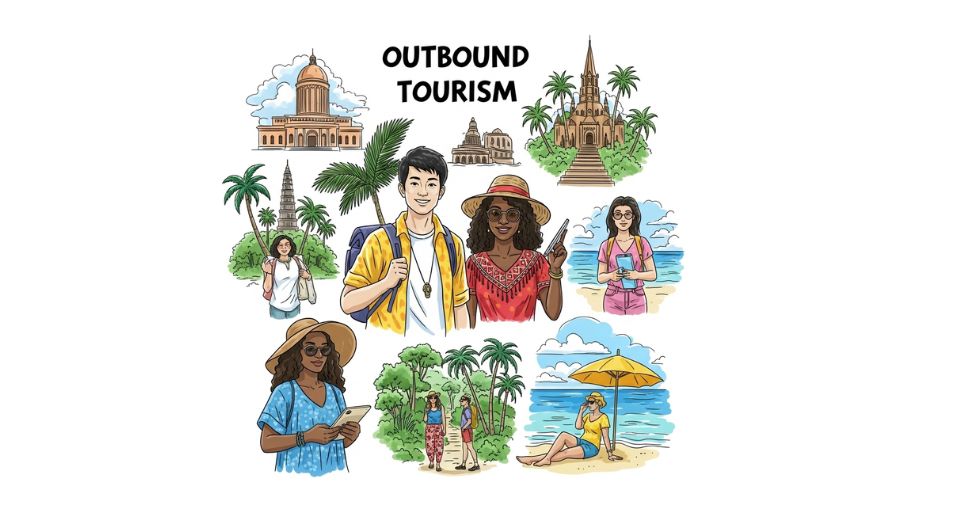MARKET OVERVIEW
The global luxury travel market is a niche but powerful sector of the overall tourism and hospitality sector. In contrast to mass-market travel, this market relies significantly on exclusivity, customization, and high-end experiences that extend far beyond typical vacation experiences. The emphasis is placed on providing not only a destination, but an emotional and experiential experience that appeals to high-net-worth individuals who desire comfort, privacy, and authenticity on a more intimate level. These are experiences that will most likely involve visibility to distant or off-the-beaten-path destinations, custom itineraries, and operations that are based on discretion and nuance as opposed to size.
What distinguishes the Global Luxury Travel industry most of all is its focus on creating unique travel experiences that feel authentic instead of staged. The industry will keep emphasizing bespoke cultural experiences, secluded accommodations, bespoke transportation, and extreme concern for seclusion. Whether it's a private villa in the Maldives, a personal wildlife reserve in South Africa, or an art-tailored tour of Florence, the focus is not so much on luxury as it is on the emotional worth of every experience.
In contrast to more traditional segments within tourism, this market does not play by set rules or trends. It is formed in large part by personal taste, seasonal exclusivity, and the ongoing quest to find what is beyond the beaten-path tourist destination. The customers here are not motivated by price, but by uniqueness and service that reads needs before they have been vocalized. The providers broadly speaking, boutique hotels and experiential travel companies will customize their services with an exactness that approaches invisibility.
As the global luxury travel market keeps changing, the trend will be towards immersive and responsible travel. The wealthy traveler will look for places that do not only provide luxury but sustainability and local sensitivity as well. What this implies is that future offerings will consist of a mix of luxury comfort and conscious decision-making, including carbon-neutral trips, locally procured food, and conservation-oriented excursions. It will not suffice to provide beauty; the background of the experience will carry just as much significance.
The global luxury travel market will also grow with the help of technology not at the expense of the human touch, but to elevate it. Artificial intelligence, augmented reality, and predictive data will be the workhorses to fine-tune experiences to an unprecedented extent. Travelers will no longer be passive recipients but actively engaged co-creators of their journeys. The distinction between travel and lifestyle will further blur as luxury is more about depth than bravado.
In short, the global luxury travel market will be a reflection of something greater than indulgence or opulence. It will be a glimpse into a way of life that esteems time, intention, and attention over everything else. The future of the market will not be established on size, but on narrative narratives that develop slowly, slowly, and with purpose that is greater than tourism. This space will keep reinventing the way upscale travelers interact with the world, opting for those experiences that are as unique as they are indelible.
Global luxury travel market is estimated to reach $1,705,933.59 Million by 2032; growing at a CAGR of 7.5% from 2025 to 2032.

GROWTH FACTORS
The global luxury travel market is expected to witness steady growth in the coming years. This growth will largely be influenced by factors such as increasing disposable income, changing lifestyles, and a growing interest in unique, high-end travel experiences. As more people seek comfort, personalized services, and exclusivity in their journeys, the demand for luxury travel is likely to rise. Travelers are no longer just looking for a place to stay; they are searching for experiences that leave a lasting impression. This includes private villas, first-class flights, customized tours, and exclusive access to events and locations. As technology continues to develop, luxury travel companies will also adopt advanced tools to enhance customer service, create seamless booking experiences, and offer virtual previews of destinations, all of which will attract more travelers.
Another major growth factor for the global luxury travel market will be the increasing interest in sustainable and responsible travel. Wealthy travelers are becoming more conscious of their environmental impact and are choosing options that align with their values. This includes eco-friendly resorts, carbon offset programs, and travel plans that support local communities. Additionally, as global connectivity improves, especially in emerging economies, more travelers from these regions will begin to explore luxury options, further expanding the market.
However, there are still some challenges that could slow down the growth of this market. Economic uncertainty and geopolitical tensions in different parts of the world might make travelers hesitant to spend on luxury experiences. Health-related concerns, such as outbreaks or ongoing effects of past pandemics, could also limit international travel and affect customer confidence. These issues may result in a short-term dip in bookings and travel spending.
Even so, the global luxury travel market holds promising opportunities. The rise of new luxury destinations, especially in lesser-known regions, will attract travelers looking for fresh and exclusive experiences. There will also be strong potential in technological innovation, with travel companies investing in AI and data analytics to predict customer preferences and deliver tailor-made experiences. Another exciting opportunity lies in space tourism, which, although still in its early stages, could become a new frontier for ultra-luxury travel.
As expectations shift and lifestyles change, the global luxury travel market will continue to adapt. Businesses that stay ahead of these changes by offering thoughtful, personalized, and sustainable travel options will likely lead the market in the future.
MARKET SEGMENTATION
By Accommodation Type
The global luxury travel market is moving toward a future shaped by changing expectations, new technologies, and a growing interest in meaningful and personalized experiences. People no longer want just a vacation; they want a complete and unique journey. This shift has encouraged luxury travel providers to rethink how they offer comfort, privacy, and service. Travelers are looking for more than just a place to stay they want experiences that reflect their tastes, values, and lifestyles. This demand is expected to drive innovation and competition across different types of accommodations.
Luxury hotels will continue to lead, but they won’t stay the same. Many will invest in smarter technologies, better energy use, and highly personalized services. Rooms that adjust to individual preferences, check-ins that use facial recognition, and virtual assistant may become common. These upgrades will help travelers feel more at home while offering a level of convenience that stands out.
Private villas and residences are expected to see strong growth. People value privacy more than ever, especially after recent global health concerns. With fully staffed homes, private pools, and customized services, villas offer both seclusion and luxury. They are especially attractive to families and groups who want to stay together without giving up high-end experiences.
Luxury resorts will also adapt. While they already offer everything from fine dining to wellness centers, future developments will focus more on sustainability and immersive activities. Resorts may partner with local experts to offer guided nature walks, hands-on craft sessions, and food tours that help visitors connect with the area.
Boutique hotels will keep attracting those who want style, character, and a personal touch. Often smaller in size, these hotels focus on design, location, and service. In the future, many will work even harder to reflect their local culture, using local materials, art, and food to create a stronger sense of place.
Safari lodges and camps will likely grow in popularity among those looking for adventure with comfort. Eco-friendly designs and partnerships with conservation groups may become more common. These lodges will aim to provide once-in-a-lifetime moments without harming the environment.
Other forms of luxury stays, including yachts and remote retreats, will also play a part. As the global luxury travel market keeps growing, success will depend on the ability to blend comfort, innovation, and personalization while keeping the human touch at the center of every stay.
By Mode of Transportation
The global luxury travel market is expected to see strong growth in the future, shaped by how people choose to move from place to place. As preferences shift, transportation will play a bigger role in how luxury is defined. Travel has always been about more than reaching a destination it’s also about the experience. In the future, that experience will be enhanced by advanced technology, personal comfort, and custom services, especially in high-end transportation.
Luxury air travel will continue to lead, offering private jets and first-class services that provide privacy, speed, and comfort. Airlines are expected to focus more on exclusive offerings, such as personalized in-flight menus, full-suite seating, and faster check-ins through digital systems. Some carriers are even exploring eco-friendly private aircrafts that mix comfort with sustainability, meeting the expectations of a newer generation of wealthy travelers who value both luxury and environmental responsibility.
Luxury train journeys are making a comeback too. More travelers are showing interest in slow, scenic trips that offer comfort and a unique way to see landscapes. Future trains may include smart cabins, private chefs, and tailored travel plans. These train journeys are not just about moving between places they’re about enjoying the ride in a relaxed, stylish way that reminds travelers of a more elegant time in travel history.
Chauffeur-driven cars will remain a favorite for those who want privacy and flexibility. This mode of travel is expected to grow with the development of smart vehicles that come with personal assistants, entertainment systems, and real-time route updates. These vehicles offer a door-to-door experience that is smooth, convenient, and customized, especially for those traveling within cities or for short trips.
Though cruise ships and yachts are often associated with group travel, they’re also part of the luxury market, especially when focused on smaller, private vessels. The future of this segment may include more eco-conscious yachts with smart systems, silent engines, and access to private islands. Travelers will want to explore unique locations while still enjoying five-star service and complete comfort.
Each of these transportation options will help define the future of the global luxury travel market, making the journey itself as important as the destination. What sets this market apart is not just the travel mode but how each part of the experience is tailored to meet high expectations. As technology improves and tastes change, the idea of luxury will shift, but the need for comfort, privacy, and unique experiences will always remain at the center.
By Tour Type
The global luxury travel market is steadily becoming one of the most promising sectors in tourism. As more people seek unique and memorable experiences, the demand for high-end travel options will only continue to rise. Travelers are no longer looking for just a holiday; they want something personal, exciting, and tailored to their preferences. This shift in mindset is helping to shape what luxury travel will look like in the years ahead.
Looking at the future of luxury travel, there is a growing interest in Customized & Private Vacations. These trips allow travelers to have complete control over their experiences. Rather than following group tours or fixed schedules, people now want to enjoy flexible plans that suit their own pace and taste. The desire for privacy, comfort, and exclusivity will make these types of vacations even more popular. It’s not just about where they go, but how they feel while they’re there.
Safari & Adventure trips are also gaining attention. With people wanting more than just comfort, the idea of exploring nature while still enjoying luxury is becoming more appealing. Travelers want to witness wildlife up close or hike through remote landscapes without giving up comfort. These kinds of adventures will continue to blend excitement with luxury in new and unexpected ways.
Cruises, Yachting & Small Ship Expeditions are also set to change. In the future, these trips will focus more on creating personal experiences instead of just offering large floating hotels. Smaller ships and yachts will take travelers to places that are less crowded, with personalized services and better attention to detail. This will give travelers the chance to explore coastal locations in a more intimate way.
Celebration Journeys are growing as well, as more people plan special trips for birthdays, anniversaries, or major milestones. These trips are about making memories with loved ones and celebrating life’s important moments in beautiful settings. With luxury services involved, these events will feel even more special and unforgettable.
Culinary Travel & Shopping is another area with strong future growth. As people become more interested in food and local culture, they will want to explore destinations through their taste buds and shopping streets. Luxury travel in this area will offer access to world-class chefs, hidden food spots, and exclusive shops.
Overall, the global luxury travel market is heading toward a more personal and meaningful future, where experiences are tailored, and comfort is guaranteed.
By End-User
The global luxury travel market is expected to see steady growth in the coming years, shaped by rising income levels, better access to exclusive experiences, and a growing desire for personalized travel. More people are looking for unique and comfortable travel options that fit their tastes. As this market becomes more focused on individual needs, travelers now want more than just a visit to a new place they want memorable experiences that feel tailor-made. Whether it’s a private island stay or a quiet mountain retreat, luxury travel is being shaped by a demand for authenticity, comfort, and personal connection.
Looking at the global luxury travel market by end-user, it can be grouped into three types: Absolute Luxury Travelers, Aspiring Luxury Travelers, and Accessible Luxury Travelers. Absolute Luxury Travelers are those who seek only the most exclusive services. They often look for privacy, top-tier service, and locations that offer peace away from large crowds. Their trips may include private chefs, guided personal tours, or entire properties reserved for their use. For this group, money is rarely a concern. The focus is on how special the experience feels.
On the other hand, Aspiring Luxury Travelers want to enjoy high-end experiences but within a more planned budget. They might not always fly private, but they still want quality and comfort. This group is willing to save for trips that offer a mix of luxury and value. Their expectations are still high, but they are more selective about where and how they spend. Travel brands are taking note and offering smart, flexible options to serve this growing group.
Accessible Luxury Travelers include those who might enjoy the occasional upscale getaway. They look for deals, seasonal offers, or well-rated properties that give them a taste of luxury without spending beyond their means. This group is expected to expand in the future, especially as more travel platforms make premium stays and experiences easier to find.
In the future, the global luxury travel market will likely rely more on technology. Personalized trip planning, AI-driven recommendations, and virtual previews of experiences will become normal. Travelers will want smarter ways to plan and enjoy their trips, while still keeping that sense of surprise and delight. Sustainability will also matter more. People will want to know their luxury experience doesn’t harm the environment or local communities. Travel companies that manage to offer comfort, meaning, and responsibility will set the standard. The next chapter in luxury travel is not just about how far one can go, but how well the journey feels.
|
Forecast Period |
2025-2032 |
|
Market Size in 2025 |
$1,037,074.09 million |
|
Market Size by 2032 |
$1,705,933.59 Million |
|
Growth Rate from 2025 to 2032 |
7.5% |
|
Base Year |
2024 |
|
Regions Covered |
North America, Europe, Asia-Pacific Green, South America, Middle East & Africa |
REGIONAL ANALYSIS
The global luxury travel market is growing steadily, shaped by a mix of changing consumer lifestyles, higher disposable incomes, and an increasing desire for personalized experiences. People now seek more than just a vacation they want moments that feel unique, comfortable, and unforgettable. Whether it’s a private villa on a tropical island, a guided cultural tour through historic cities, or a wellness retreat hidden in the mountains, the focus is on quality over quantity. As technology continues to develop, this market will also benefit from smarter booking systems, virtual previews of destinations, and services tailored to individual preferences, making luxury travel more accessible to those who want it done their way.
Geography plays a major role in shaping the future of this market. North America, with the U.S., Canada, and Mexico, will likely continue to lead due to its strong infrastructure, high consumer spending, and growing demand for tailor-made experiences. The U.S. especially will be at the front, as travelers there are more inclined to invest in exclusive getaways and unique adventures. In Europe, countries like the UK, Germany, France, and Italy are already popular luxury travel spots. Their rich history, art, and cultural landmarks will continue to attract high-end tourists. Europe’s well-connected transportation and diverse landscapes also give travelers many choices, from relaxing coastlines to vibrant cities.
The Asia-Pacific region, which includes India, China, Japan, South Korea, and others, is expected to grow the fastest. A rising middle class and increased interest in overseas travel are helping drive this growth. Countries like China and India, where people are spending more on travel than ever before, will be important to watch. As travel norms shift, travelers from these regions will seek out new destinations, creating demand for high-end services and accommodations both at home and abroad. South America, with countries such as Brazil and Argentina, is also starting to gain attention. Nature lovers and adventure seekers are being drawn to the region, and as infrastructure improves, luxury travel will follow.
Meanwhile, the Middle East & Africa especially places like the GCC countries, Egypt, and South Africa will play a bigger role. These regions offer rich cultural experiences, luxury resorts, and unique landscapes. With ongoing investments in tourism and hospitality, they are setting the stage to welcome a growing number of luxury travelers in the years to come.

COMPETITIVE PLAYERS
The global luxury travel market is growing steadily and shows strong signs of long-term potential. As travel becomes more accessible to a wider audience, a smaller group of travelers continues to seek out personalized, high-end experiences. These travelers often look for comfort, exclusivity, and authenticity. The market is shaped by a desire for more than just vacations; travelers want something meaningful, whether it’s a cultural tour, a wellness retreat, or a private expedition. With this shift in expectations, companies in the luxury travel space are adjusting their services to stay relevant and keep attracting this kind of customer.
Looking ahead, this market will likely be influenced by technology and changing values. Travelers will expect seamless digital experiences alongside personalized service. Companies that offer a smooth blend of online planning and real-world luxury will stay competitive. Sustainability will also play a major role. Clients are increasingly aware of their environmental impact, and many will choose travel brands that align with their values. This means operators need to find ways to deliver unforgettable experiences while minimizing their footprint.
Competition in the global luxury travel market is heating up, with many well-known names working hard to offer something unique. Accor and Four Seasons Hotel Limited are examples of brands known for setting high standards in hospitality. Ker & Downey and Tauck, Inc. specialize in customized trips that focus on individual preferences. Black Tomato Group is known for creative travel planning that turns ideas into real adventures. Gran Hotel La Florida and Belmond Management Limited offer luxurious stays in some of the most scenic places in the world. Abercrombie & Kent USA, LLC and Micato Safaris, Inc. provide tailored journeys that emphasize quality and attention to detail. Meanwhile, Lindblad Expeditions and Exodus Travels focus on exploration and learning, giving travelers more than just comfort. Other players like Asia Transpacific Journeys, Journeys 360 Travel, and Butterfield & Robinson Inc. continue to expand by offering highly curated experiences. Scott Dunn Ltd., Voyage Privé, Thomas Cook Group Plc, and Cox & Kings Ltd all bring their own strengths, from insider access to exclusive packages and private guides.
As the global luxury travel market continues to grow, competition will encourage better service, smarter technology, and more focus on sustainability. Brands that can adapt to what luxury travelers want in the future will have a clear advantage.
Luxury Travel Market Key Segments:
By Accommodation Type
- Luxury Hotels
- Private Villas and Residences
- Luxury Resorts
- Boutique Hotels
- Safari Lodges and Camps
- Other
By Mode of Transportation
- Luxury Air Travel
- Luxury Train Journeys
- Chauffeur-driven Cars
- Cruise Ships and Yachts
By Tour Type
- Customized & Private Vacations
- Safari & Adventure
- Cruises, Yachting & Small Ship Expeditions
- Celebration Journeys
- Culinary Travel & Shopping
By End-User
- Absolute Luxury Travelers
- Aspiring Luxury Travelers
- Accessible Luxury Travelers
Key Global Luxury Travel Industry Players
- Accor
- Four Seasons Hotel Limited
- Ker & Downey
- Tauck, Inc.
- Black Tomato Group
- Gran Hotel La Florida
- Belmond Management Limited
- Abercrombie & Kent USA, LLC
- Micato Safaris, Inc.
- Lindblad Expeditions
- Exodus Travels
- Asia Transpacific Journeys
- Journeys 360 Travel
- Butterfield & Robinson Inc.
- Scott Dunn Ltd.
- Voyage Privé
- Thomas Cook Group Plc
- Cox & Kings Ltd.
WHAT REPORT PROVIDES
- Full in-depth analysis of the parent Industry
- Important changes in market and its dynamics
- Segmentation details of the market
- Former, on-going, and projected market analysis in terms of volume and value
- Assessment of niche industry developments
- Market share analysis
- Key strategies of major players
- Emerging segments and regional growth potential








 US: +1 3023308252
US: +1 3023308252






